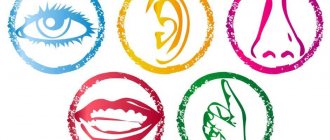What is character?
- Character, personality, personality refers to the sum of characteristics that a person possesses. Character refers primarily to moral qualities, ethical standards, principles and the like; a man of impeccable character.
- Individuality refers to the distinctive qualities that make a person recognizable as an individual different from others; a woman with a strong personality.
- Personality refers to the combination of external and internal characteristics that determine the impression a person makes on others: a child with a bright or pleasant personality.
What kind of character does a person have?
Correct assessment begins with determining what types of character people have. All traits are distributed into five main groups:
Social
It includes traits determined by attitude:
- to yourself;
- labor;
- to society.
Emotional
It includes:
- expressiveness;
- impressionability;
- cheerfulness;
- high and low emotionality;
- impulsiveness;
- impressiveness;
- unstable emotionality.
Strong-willed
It includes:
- focus;
- determination;
- persistence;
- uncertainty;
- courage;
- discipline;
- independence.
Intelligent
It includes:
- prudence;
- depth and flexibility of intelligence;
- resourcefulness;
- mindset (practical or theoretical);
- frivolity;
- intelligence;
- curiosity;
- thoughtfulness.
Moral
It includes the following features:
- rigidity;
- kindness;
- responsiveness;
- honesty and similar qualities.
To compile a psychological portrait, certain qualities are noted.
Properties of temperament
Each temperament has certain properties.
Sensitivity
This implies the necessary minimum force of external stimulation to initiate reactions in the individual’s psyche. In addition, sensitivity involves assessing the speed of this reaction.
Reactivity
Determines the strength and speed of response to an unexpected stimulus, that is, these are involuntary reactions to light, loud sound, unexpected action. A person’s distractibility and ability to concentrate depend on reactivity.
Activity (passivity)
The degree of influence of temperament on the stimuli surrounding it. Simply put, this is the speed with which a person can influence the circumstances and obstacles that prevent him from achieving his goal. Activity stems from the relationship between a person’s orientation to the outside world (previous point) and focus on one’s goals, desires, needs, and beliefs.
Plasticity (rigidity)
This characterizes the speed of a person’s adaptation to changes in the external environment. Plasticity is a good ability to adapt, rigidity is the impossibility, difficulty in changing beliefs, views, interests.
Extraversion (introversion)
A person’s orientation towards the external or internal world (direction of vital energy). The second interpretation: a person’s orientation towards the external present (extroversion) or the figurative past or future (introversion).
Excitability of emotions
Determines the speed of emotional response to a minimal external stimulus (the minimal force to which an emotional reaction occurs).
Rate of reactions
This is the speed of mental processes and reactions (duration): speed of reaction, rate of speech, speed of mind.
The properties of temperament manifest themselves depending on the situation and specific conditions. Therefore, people of different temperaments can act completely differently in identical situations, but in the same way under different conditions.
What are the character traits of a person?
The positive ones include:
- adequacy, altruism, activity;
- fearlessness, frugality, prudence, nobility;
- generosity, good manners, politeness, attentiveness, cheerful disposition, will, high morality;
- humanism, gallantry, harmony;
- friendliness, delicacy, conscientiousness, discipline, foresight, diplomacy, efficiency, kindness, good nature;
- naturalness;
- femininity, cheerfulness;
- caring, thrifty;
- ingenuity, initiative, diligence, sincerity, intelligence;
- creativity, sociability, correctness, culture, competence, collectivism, eloquence;
- curiosity, affection, ease of communication;
- wisdom, masculinity, peacefulness, dreaminess;
- tenderness, independence, reliability, observation, resourcefulness;
- experience, sociability, charm, education, caution, responsibility, neatness, responsiveness, talent, objectivity;
- decency, positivity, practicality, understanding, friendliness;
- decisiveness, romance, cordiality;
- self-criticism, modesty, intelligence, conscientiousness, independence;
- tactfulness, hard work, desire for creativity, patience;
- smiling, perseverance, poise, respectfulness, perseverance, courtesy, perseverance;
- thriftiness, charisma, courage;
- chastity, determination;
- sincerity, honesty, sensitivity;
- generosity, playfulness;
- energy, economy, enthusiasm, empathy, erudition.
Negative qualities include all the antipodes of the listed traits.
For example:
- aggressiveness;
- vulgarity;
- impudence;
- envy;
- arrogance;
- deceit;
- commercialism;
- narcissism;
- touchiness;
- selfishness;
- callousness, etc.
Every positive trait has an opposite meaning. However, there are some qualities that can be called neutral:
- shyness;
- silence;
- assertiveness;
- shyness;
- daydreaming.
For some people these are positive qualities, for others they may be negative. For example, assertiveness. In business it is sometimes necessary, but in personal relationships it sometimes gets in the way. Shyness is good for a girl, but is perceived negatively when it appears in a young man. When drawing up a psychological portrait, all of the above positive qualities, their antipodes and other features are taken into account.
Character and temperament
If we take any person as an example, we will immediately discover that he is an individual with his own worldview and his own individual traits. And a certain idea of it will always be deposited in our consciousness, i.e. we will give it an appropriate description. But what determines this description? Some will say that it is a matter of temperament, others will be sure that the essence is character. But both will turn out to be right. What to do in this situation? How to clearly distinguish between character and temperament? It is this relationship between character and temperament that has been the object of study by scientists for many years. And thanks to these studies, four different opinions emerged:
- Character and temperament are identical
- Character and temperament are opposed to each other
- Temperament is part of character
- Temperament is the basis of character
And the scientific interpretation of these two terms allows us to more clearly draw a dividing line between them.
Character differs from temperament in that it is a complex of qualities manifested in relation to phenomena and objects of the external world; it, like temperament, is determined by the work of the mental apparatus, but is capable of forming and changing in the process of life.
Many psychologists, as already indicated, tried to classify character, but its connection with temperament made this task difficult, which is why such types of character as rational, strong-willed and emotional are also associated with the influence of society and natural personal characteristics. But character can also be classified by the presence of special traits in it. This:
- Attitude towards objects of the external world (neatness, generosity, etc.)
- Attitude to activity (laziness, perseverance, etc.)
- Attitude towards people (humaneness, responsiveness, etc.)
- Attitude towards oneself (pride, selfishness, etc.)
Temperament , in turn, is a set of mental properties that affect the behavior and activity of an individual. The nervous system is responsible for the level of concentration, speed of the thought process, memory, etc. And it is the nervous system that is the basis of one of the four types of temperament:
- Melancholic type
- Phlegmatic type
- Sanguine type
- Choleric type
It follows from this that the characteristics of character and temperament are that they are often confused. So, for example, hereditary qualities of a person can be considered mental manifestations and vice versa, speaking of traits acquired in society as individual properties of the nervous system.
In reality, distinguishing between character and temperament is very simple. Their relationship is presented in the following forms:
- Character and character traits can be assessed, but temperament cannot be assessed;
- Temperament types have long been classified, but character types are not classified to this day;
- Character can change in the course of life, but temperament cannot change;
- Character is a set of acquired qualities, while temperament is a set of innate ones.
Character and temperament will most likely be confused with each other for a very, very long time. This is especially true for those people who have never wondered about the differences between them. You can now clearly determine both your own character and temperament, and the character and temperament of the people around you. But remember that it is the tandem of character and temperament that creates a holistic, harmonious personality. And the most important thing is that the acquired qualities of a person’s personality are always in harmony with those inherent in him from birth.
You can better understand your personality type, character and temperament in the “Self-Knowledge” course. Join us!
Manifestation of character and temperament
A person’s character is not formed instantly, but until old age. The social environment is of great importance. For example, the volitional qualities inherent in a person manifest themselves in emergency situations when endurance, courage, stubbornness, etc. are required.
Emotionality is mental manifestations that arise in certain situations. In this case, feelings can be negative or positive, dynamic or stable, neutral. If we talk about intelligence, then this includes the individual characteristics and quality of thinking of an individual. For example, criticality, stupidity, breadth of soul, flexibility in any relationship, etc.
The character of people greatly influences their perception of the environment. Some consider everyone good or bad, others only themselves. Each person has a certain attitude:
- to oneself (self-esteem, self-criticism, self-respect, etc.);
- labor (punctuality, accuracy, negligence, etc.);
- environment (politeness, isolation, sociability, rudeness, etc.).
As a result, a certain temperament is formed. It includes qualities that are constant for a particular person:
1. Sanguine people are very mobile and efficient, but they quickly get tired of hard work. They have bright facial expressions and strong expressions of emotions. They are sociable, responsive, balanced. They look at everything from a positive point of view and are optimistic. They have a cheerful disposition.
2. Cholerics are characterized by sudden mood swings, hysteria, and impetuosity. They have frequent outbursts of anger, short temper, but quick release.
3. Melancholic people are pessimists, they worry excessively about any reason, and are often in an anxious state. Such people are very distrustful of others, vulnerable, reserved, and have good self-control.
4. Phlegmatic people have very low activity. However, they are very reasonable, cold-blooded and prudent. Any task is always completed.
Separately, it is worth noting that each nationality has its own character traits, although there are many common features. The greatest diversity is among the Russians.
Their character is very different from other nationalities.
Main criteria:
a) Spiritual generosity, which most nationalities do not have. b) Compassion.
c) Craving for justice.
d) Patience, endurance, perseverance.
e) Negative qualities include pessimism, foul language, laziness, hypocrisy. The positive ones are responsiveness, loyalty, compassion, humanity.
Russians are easily distinguished by a combination of character traits, one of which is a special sense of humor, which other nationalities are not always able to understand. The set of qualities is so diverse that most people experience excessive expression of emotions. Some traits may change throughout life. However, other qualities remain unchanged. However, negative traits are not always regarded as negative. Sometimes they emphasize dignity.
For example:
1. Selfishness is not only ignoring other people, but also putting one's own interests first. Such a person has his own opinion and will not follow the lead of others.
2. Self-confidence can improve productivity and performance. Then the person feels self-satisfied, which ultimately brings positive results for society.
3. Envy sometimes pushes a person to work better and achieve the best result.
4. Stubbornness helps you achieve any goals you set.
The character of any person consists of positive and negative qualities. As a result, a certain type is formed. For example, a person can be lazy, but kind and sympathetic. The other is angry, but very hardworking and aspiring. At the same time, women are always more emotional, selfless, good-natured, and patient. Men are most often reserved, decisive, and responsible.
Human character, temperament.
Why do you think our master is so evil? “That’s his nature,” I say. “It’s nature,” the milker grunts, “but it’s not nature at all!”
The nude, natural in the divine climate of Greece, in the youth of mankind, when poetry and the arts blossomed like the flowers of mental spring, gave birth to Phidias, Lysippos, Cleomenes, Agasius, Agesander, Apelles, Zeuxis, Polygnotus, just as it later gave birth to Michelangelo and the marvelous the creators of the Renaissance (speaking of the nude, we also mean its indispensable companion, drapery, inseparable from the nude, just as harmony is inseparable from the melody); however, during the Renaissance, nudity became nothing more than a convention; At this time, a person was already unthinkable without clothes.
There is no contradiction in our words: a living nature is always a poetic nature, although it does not at all follow from this that a person with a living nature is necessarily a poet: otherwise it would be easy to make a poet out of Napoleon and bring his name into the history of French poetry.
What we now call the natural sciences was then called “natural philosophy” (and the root is the same: nature, nature, i.e.
Essentially speaking, we can directly contrast these two concepts - “nature” and “culture”, natural and cultivated.
Nature - that wonderful nature that Carlo spoke about with sparkling eyes, infecting everyone with his irrepressible enthusiasm - was located in the depths of the country.
His nature was quite rich; he was not stupid and at the same time talented, he sang well, played the guitar, spoke very smartly and wrote very easily, especially government papers, which he got his hands on when he was a regimental adjutant; but what was most remarkable about his nature was his self-loving energy, which, although it was most based on this petty talent, was in itself a sharp and striking trait.
No, Terry, human nature is human nature, and where one gets away with it, everyone will get away with it.
No. 4) as if in swollen eyelids; large pupil without any individual expression; thick long eyelashes, a thick and long eyebrow (the general impression of the eyes is “sleepy”) - a lazy, apathetic nature, but not without a share of observation in its passivity; understanding is dull; lack of energy; but the nature is rather soft than rough.
There is nothing strange... I have such a nature... I am used to breaking into people by force in my position... the habit is second nature!
Human character traits (weaknesses and strengths)
| Character Strengths | Character Weaknesses |
| Brave | Reckless |
| Idealistic | Naive |
| Funny | Frivolous |
| Confident | Arrogant |
| Careful | Timid |
| Virtuous | Hard |
| Open-minded | Excessive |
| Definite | Stubborn |
| Loyal | Ostrovny |
| Modest | Passive |
| Patient | Unproductive |
| Vigorous | Exhausting |
| Independent | Outsider |
| Figurative | Unrealistic |
| Charismatic | Self-centered |
| Emotional | Illogical |
| Proud | Conceited |
| Managed | Greedy |
| Logical | Unempathetic |
| Honest | Blunt |
| Decisive | Impulsive |
| A born leader | Imperious |
| Concentrated | Addictive personality |
| Curious | Aimless |
| Kind | Unassuming |
| Principal | Intolerant |
| Charming | False |
| Adaptable | Structureless |
| Realistic | Cynical |
Can you remember what I missed? Leave a comment and I'll add them to the post!











